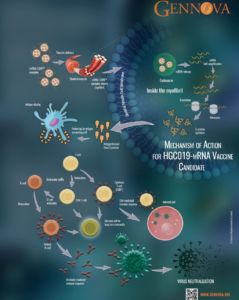In News: Pune-based Gennova Biopharmaceuticals is conducting human trials of its mRNA-based vaccine against the SARS-CoV-2, the novel coronavirus virus that causes COVID-19, which is India’s first indigenous COVID-19 vaccine based on the messenger RNA platform.
About HGCO19
- Gennova in collaboration with HDT Biotech Corporation, Seattle, USA has worked together to develop an mRNA vaccine since the first report of the SARS-CoV-2 genome was published.
- HGC019 has already demonstrated safety, immunogenicity, neutralization antibody activity in the rodent and non-human primate models.
- The novel mRNA vaccine candidate, HGC019, has all the necessary information to guide the host cells to make the antigen – spike protein of the virus, reported to interact with host cells receptor, and supported by ‘lipid inorganic nanoparticle (LION)’ as a delivery vehicle.
- The neutralizing antibody response of the vaccine in mice and non-human primates was comparable with the sera from the convalescent patients of COVID-19.
Mechanism of Action vaccine-HGC019
- mRNA vaccine candidate HGCO19 contains a short, synthetic version encoding the spike protein (antigen) of the novel coronavirus, SARS-CoV-2, reported to interact with receptors on host cells.
- When the vaccine is injected into the body the synthetic mRNA is taken to muscle cells where it instructs cells to make numerous copies of mRNA and copies of the antigen.
- Gennova’s approach is also similar and gives the advantage over other vaccine candidates to present the identically folded form of spike protein of coronavirus as it is reported during its infection cycle.
- Other immune cells would then act on the spike proteins and in the process learn to identify the coronavirus and protect the body if the person were ever to be actually infected.
- The mRNA is associated with the ‘lipid inorganic nanoparticle (LION) and acts as mRNA vaccine delivery system’ which stabilizes the mRNA and acts as adjuvant till delivery into patients.

Uniqueness Gennova vaccine
- Gennova uses the most prominent mutant of spike protein (D614G) as a vaccine candidate.
- HGCO19 uses the self-amplifying mRNA platform, which gives the advantage of a low dosing regimen.
- HGCO19 uses the adsorption chemistry so that the mRNA is attached on the surface of the nano-lipid carrier to enhance the release kinetics of the mRNA within the cells.
- HGCO19 is stable at 2-8°C.
mRNA Vaccines
- In standard viral vaccines, either inactivated (or attenuated) virus or viral proteins known to cause infection are used to immunize.
- However, the mRNA vaccines do not use this conventional model to immunize. mRNA vaccine carries the molecular instructions to make the protein in the body through a synthetic RNA of the virus.
- The host body uses this to produce the viral protein that is recognized by the immune system, thereby making the body ready to fight against the disease.
Advantages of mRNA vaccines
- Novel vaccine development can take anywhere between 10 – 15 years.Considering the immediate need for a vaccine against COVID 19, the developmental time for the vaccine must be reduced.
- mRNA based vaccines are thus the ideal choice because of their rapid developmental timeline.
- mRNA vaccines are considered safe as mRNA is non-infectious, non-integrating in nature, and degraded by normal cellular mechanisms.
- They are highly efficacious because of their inherent capability of being translatable into the protein structure inside the cell cytoplasm.
- mRNA vaccines are fully synthetic and do not require a host for growth, e.g. eggs or bacteria. Therefore, they can be quickly manufactured in an inexpensive manner under cGMP conditions to ensure their “availability” and “accessibility” for mass vaccination on a sustainable basis.
Additional Link: https://journalsofindia.com/spike-protein-of-sars-cov-2/
















